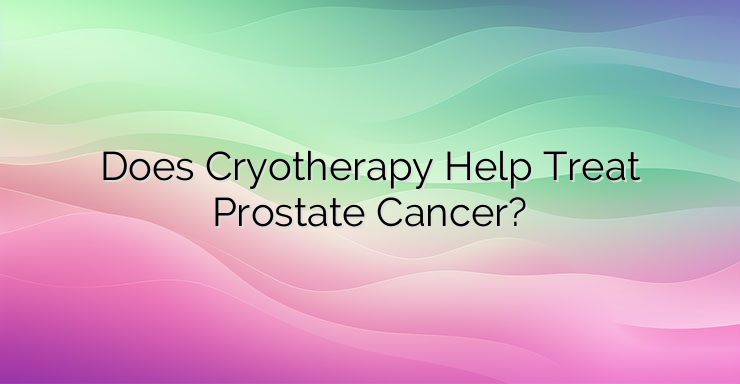What is cryotherapy? Cryotherapy uses extremely low temperatures to freeze and destroy cancerous tissue in the prostate. There are several long-term studies that focus on cryotherapy as a treatment for prostate cancer. The prostate is a walnut-sized organ that sits below the bladder and surrounds the urethra, the tube that carries urine out of the bladder. Seminal fluid from the gonads (testes) also passes through the urethra. As we age, the prostate sometimes becomes subject to some health problems in men. One of them is prostate cancer. Even with early diagnosis and conventional treatment, 30% to 40% of men experience a recurrence of prostate cancer. This means that in many cases patients need additional treatment. Some experts believe that cryotherapy is an option for treating recurrent prostate cancer, especially if the initial radiation therapy did not kill enough cancer cells. How is cryotherapy performed? In cryotherapy, a very thin metal probe or needle is inserted into the prostate gland. This is done through an incision between the anus and the scrotum (perineum). To protect the urethra from the cold temperatures of the procedure, a catheter may be used to introduce warm saline. The surgeon uses visual information obtained by ultrasound during the procedure. A freezing liquid, such as liquid nitrogen or, more commonly, argon gas, is introduced through the probe into the prostate gland. Cold temperatures freeze and destroy cancerous tissue in the prostate. By using the ultrasound images to identify cancerous tissue, the surgeon can limit damage to normal prostate tissue. How does cryotherapy kill prostate cancer? Any living tissue, whether healthy or pathological, cannot tolerate extreme cold. Injecting nitrogen or argon gas into the prostate gland rapidly lowers the temperature of the tissue, causing ice crystals to form and cell membranes to rupture. This is followed by tissue damage and eventually cell death. After the cancer cells are destroyed, white blood cells clean away the dead cells and tissue. Some studies show that during this process, the immune system attacks cancer cells that are still unaffected. Are there benefits to using cryotherapy for prostate cancer? There are few long-term studies on cryotherapy and prostate cancer. However, some experts believe that this method of treatment offers several advantages over surgery and radiotherapy (radiation therapy). These benefits may be particularly noticeable in early-stage prostate cancer. For example, cryotherapy is a less invasive procedure. The therapy may be performed using epidural or spinal anesthesia instead of general anesthesia. This may be beneficial in older men with prostate cancer.The treatment may also benefit men who have other conditions such as diabetes, heart disease or lung disease. Other benefits of cryotherapy include: Less blood loss; Shorter hospital stay (usually one or two days); Shorter recovery period; Much less swelling and pain than standard prostate cancer surgery. If necessary, cryotherapy can be followed by other conventional therapies, such as radiotherapy or surgery. In a recent study that followed men with prostate cancer over a 10-year period, researchers concluded that cryotherapy may be as effective as radiation therapy and other common prostate cancer treatments. What are the risks of cryotherapy for prostate cancer? Experts believe that sometimes the freezing liquid fails to kill all the cancer cells. As a result, the prostate cancer is likely to come back (recur). In addition, some side effects may occur with cryotherapy. These side effects may include: Injury to the urethra and bladder; Serious infections as a result of injury; Obstruction of the urethra. In addition, the risks of cryotherapy are similar to other prostate cancer treatments, such as: Impotence; Incontinence; Recurrence of prostate cancer. There is still not enough definitive data on the effectiveness of cryotherapy in the treatment of prostate cancer. Some experts believe that cryotherapy may be most effective for recurrent prostate cancer that is confined to the prostate gland. References: 1. American Cancer Society. Recurrent Prostate Cancer: Cryosurgery Offers ‘Curative’ Treatment 2. Prostate Cancer Institute. Cryotherapy for Prostate Cancer 3. National Cancer Institute. Prostate Cancer – Cancer Stat Facts 4. WebMD. Cryotherapy for Prostate Cancer TreatmentIn addition, some side effects may occur with cryotherapy. These side effects may include: Injury to the urethra and bladder; Serious infections as a result of injury; Obstruction of the urethra. In addition, the risks of cryotherapy are similar to other prostate cancer treatments, such as: Impotence; Incontinence; Recurrence of prostate cancer. There is still not enough definitive data on the effectiveness of cryotherapy in the treatment of prostate cancer. Some experts believe that cryotherapy may be most effective for recurrent prostate cancer that is confined to the prostate gland. References: 1. American Cancer Society. Recurrent Prostate Cancer: Cryosurgery Offers ‘Curative’ Treatment 2. Prostate Cancer Institute. Cryotherapy for Prostate Cancer 3. National Cancer Institute. Prostate Cancer – Cancer Stat Facts 4. WebMD. Cryotherapy for Prostate Cancer TreatmentIn addition, some side effects may occur with cryotherapy. These side effects may include: Injury to the urethra and bladder; Serious infections as a result of injury; Obstruction of the urethra. In addition, the risks of cryotherapy are similar to other prostate cancer treatments, such as: Impotence; Incontinence; Recurrence of prostate cancer. There is still not enough definitive data on the effectiveness of cryotherapy in the treatment of prostate cancer. Some experts believe that cryotherapy may be most effective for recurrent prostate cancer that is confined to the prostate gland. References: 1. American Cancer Society. Recurrent Prostate Cancer: Cryosurgery Offers ‘Curative’ Treatment 2. Prostate Cancer Institute. Cryotherapy for Prostate Cancer 3. National Cancer Institute. Prostate Cancer – Cancer Stat Facts 4. WebMD. Cryotherapy for Prostate Cancer Treatment


Leave a Reply